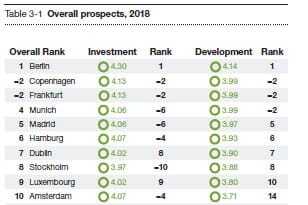Copenhagen and Madrid will join the ranks of Berlin, Frankfurt, and Munich as the top cities for real estate investment and development in 2018, according to Emerging Trends in Real Estate® Europe 2018. The annual forecast, published jointly by ULI and PwC, is based on the opinions of over 800 real estate professionals in Europe, including investors, developers, lenders, agents, and consultants.
For the fourth year in a row, Berlin has taken the top spot in the Emerging Trends city rankings, further establishing its dominance in the European property market. Frankfurt has risen to second place after a year of solid growth, much of which has come from the financial sector in the aftermath of Brexit. Tied with Frankfurt is Copenhagen, whose booming residential sector has captured the attention of the international real estate industry. At number four is Munich, which—while expensive—has remained an attractive market for investors and developers alike. Madrid, benefiting from positive office rental growth prospects, has jumped four places to take the fifth spot.
In terms of sectors, logistics has firmly established itself as the most desirable sector for investors in 2018. Niche residential sectors such as student housing, senior living, and healthcare are also seen as good bets. Meanwhile, investors seem to be shying away from retail and office, the two traditionally dominant real estate sectors. The already-declining perception of retail has been affected by negative trends in the U.S., while suburban offices and business parks are expected to be left behind by increasing urbanization. Shared and serviced offices, however, are seeing an increased interest among investors.
According to the report, the property industry is cautiously optimistic about its European business prospects in 2018. Around half of survey respondents predict that profits and headcounts will increase next year and 42 percent expect an increase in business confidence—a 10 percent jump from last year’s results.
The report also points out the increasing complexity of how the real estate industry conducts business, brought on by new customer demands and the concept of “space as a service”. These new requirements mean that real estate companies will require new skillsets to harness big data and new technology to improve decision making, management, and valuation processes.
“Our conversations with industry leaders have demonstrated that technology is increasingly being viewed as one of the key trends affecting real estate,” said Lisette van Doorn, Chief Executive of ULI Europe. “We are seeing a growing emphasis on the impact technology has on all aspects of real estate, ranging from the changing behaviour of users to the real estate management and valuation process, and the new skills needed to successfully adapt to this new reality.”
Gareth Lewis, PwC real estate director, said, “Against a backdrop of a brighter general economic outlook and stronger occupier demand across much of Europe, our interviews with industry leaders reveal a sector that is looking more closely at disruption and beyond the traditional timeframe of the property cycle. Businesses are being challenged to remain relevant in the face of increasing disruption, to respond to emerging new market entrants and to seize the opportunities presented by forming new partnerships and business models.”
The industry’s optimism is bolstered by an improving macroeconomic outlook for the Eurozone and real estate’s continued attractiveness as an asset class. So far, 2017 has seen an upturn in overall investment volumes and improving occupier demand in many of Europe’s major cities. Equity and debt are expected to be just as plentiful as in 2017 and—despite the threat of rising interest rates—high levels of investment are predicted to continue. In addition, the 2017 election results in France and the Netherlands have restored some confidence in Europe’s political stability: over a quarter of respondents see an improving political environment for 2018.
However, several issues are still proving worrisome for investors. As in the last few years, the key concern for Europe’s real estate industry centres on the availability of suitable assets. More than 75 percent of those surveyed believe that investors are taking more risks to achieve target returns; however, many key industry players indicated a more measured approach to risk-taking in 2018.
Brexit also remains a challenge for the real estate industry. While the degree of Brexit-related pessimism has decreased considerably since last year’s report—and few question London’s long-term status as a destination for global capital—the uncertainty surrounding the terms of the UK’s departure from the EU has been a source of frustration for real estate professionals.






